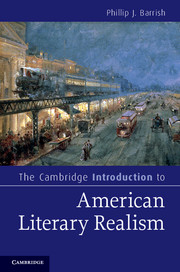Book contents
- Frontmatter
- Contents
- Illustrations
- Acknowledgments
- Introduction: American literary realism
- Chapter 1 Literary precursors, literary contexts
- Chapter 2 The “look of agony” and everyday middle-class life
- Chapter 3 Creating the “odour” of the real
- Chapter 4 Conflicting manners
- Chapter 5 “Democracy in literature”?
- Chapter 6 “The blab of the pave”
- Chapter 7 Crisis of agency
- Chapter 8 “Certain facts of life”
- Chapter 9 “The unjust spirit of caste”
- Chapter 10 New Americans write realism
- Conclusion: realisms after realism
- Notes
- Works cited
- Index
Chapter 9 - “The unjust spirit of caste”
realism and race
Published online by Cambridge University Press: 05 June 2012
- Frontmatter
- Contents
- Illustrations
- Acknowledgments
- Introduction: American literary realism
- Chapter 1 Literary precursors, literary contexts
- Chapter 2 The “look of agony” and everyday middle-class life
- Chapter 3 Creating the “odour” of the real
- Chapter 4 Conflicting manners
- Chapter 5 “Democracy in literature”?
- Chapter 6 “The blab of the pave”
- Chapter 7 Crisis of agency
- Chapter 8 “Certain facts of life”
- Chapter 9 “The unjust spirit of caste”
- Chapter 10 New Americans write realism
- Conclusion: realisms after realism
- Notes
- Works cited
- Index
Summary
In white Southern writer Thomas Nelson Page’s short story “Marse Chan,” which appeared in New York’s prestigious Century Magazine in 1884 and was then widely reprinted, an elderly African-American character named Sam waxes nostalgic to a white visitor from the North. The Civil War has ended and Sam’s former owner is dead, but he still resides on the once wealthy, now dilapidated, plantation where he used to be a slave. Speaking of his life before the war, Sam insists to his visitor,
Dem wuz good ole times, marster – de bes’ Sam ever see! Dey wuz, in fac’! Niggers didn’ hed nothin’ ’t all to do – jes’ hed to ’ten’ to de feedin’ an’ cleanin’ de hosses, an’ doin’ what de marster tell ’em to do; an’ when dey wuz sick, dey had things sont ’em out de house, an’ de same doctor come to see ’em whar ’ten’ to de white folks when dey wuz po’ly. Dyar warn’ no trouble nor nothin’. (935)
The heavily marked rural African-American dialect spoken by Sam identifies this story as part of the local-color movement that became so popular in the 1880s, especially in the short-story form. As we saw in Chapter 5, late-nineteenth-century local-color fiction, later also called regionalism, was characteristically set in places removed from the nation’s centers of economic, political, and cultural authority, and it made the speech, manners, and geography local to its setting inseparable from the story being told.
“Marse Chan,” however, along with the other stories Thomas Nelson Page collected in a volume he titled In Ole Virginia (1887), helped constitute a distinct sub-category of local-color writing often referred to as the “plantation school.” Other plantation-school writers included Joel Chandler Harris, author of the immensely popular Uncle Remus stories, the Louisiana writer Grace King, and, in the twentieth century, Margaret Mitchell, whose Gone with the Wind achieved blockbuster status first as a novel and then as a movie in the 1930s. Plantation-school writing by these white Southerners painted nostalgic, sometimes humorous pictures of the South before the Civil War. It depicted the so-called “Old South” as a stable world in which the noble values of honor and chivalry thrived and loyal, happy slaves lived on beautiful plantations, where their benevolent owners regarded them as members of their own extended families – as “overgrown children” in the words of one nostalgic author (Avirett, Old Plantation iv). We saw in Chapter 5 that critics still heatedly debate the social meanings and cultural functions of regionalist works such as Sarah Orne Jewett’s The Country of the Pointed Firs. By contrast, there is today little debate regarding the pernicious cultural work performed by most plantation-school writing in the late nineteenth and early twentieth centuries.
- Type
- Chapter
- Information
- The Cambridge Introduction to American Literary Realism , pp. 154 - 172Publisher: Cambridge University PressPrint publication year: 2011



